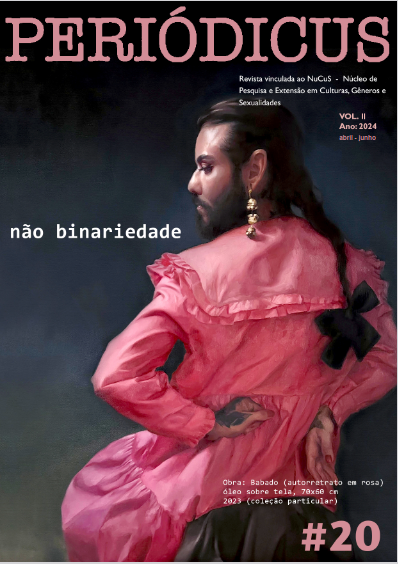"Homens que curtem”
reflexões etnográficas sobre pesquisas com homens com práticas bissexuais na periferia da cidade
DOI:
https://doi.org/10.9771/peri.v2i20.55572Resumo
O texto discute os desafios metodológicos de envolver homens que fazem sexo com homens e com mulheres (HSHMs) nas pesquisas, apontados nos estudos sobre comportamento sexual e epidemia do HIV/aids como fugidios a pesquisadories. Embasado em pesquisa na Região Metropolitana do Recife, argumentamos que a dificuldade está relacionada à operacionalização dos próprios conceitos que orientam o olhar para os territórios onde homens com práticas homossexuais transitam – sociabilidade, região moral, gueto e comunidade – e a facilidade que alguns dos territórios oferece para es pesquisadories realizarem sua tarefa. Do mesmo modo, a nomeação homossexual, presente em termos de consentimento esclarecido, roteiros de entrevista e questionários, pode afastar os HSHMs das pesquisas, que, como mostra nossa etnografia, são descritos como simpatizantes, e se percebem como entendidos, o que os capacita a se engajarem na curtição.
Downloads
Downloads
Publicado
Como Citar
Edição
Seção
Licença
Copyright (c) 2024 Luís Felipe Rios, Mateus Souza Araújo

Este trabalho está licenciado sob uma licença Creative Commons Attribution-NonCommercial 4.0 International License.
Autores que publicam nesta revista concordam com os seguintes termos:
Autores mantêm os direitos autorais e concedem à revista o direito de primeira publicação, com o trabalho simultaneamente licenciado sob Licença Creative Commons Attribution Noncommercial que permite o compartilhamento do trabalho com reconhecimento da autoria e publicação inicial nesta revista, sendo vedado o uso com fins comerciais.
Autores têm autorização para assumir contratos adicionais separadamente, para distribuição não-exclusiva da versão do trabalho publicada nesta revista (ex.: publicar em repositório institucional ou como capítulo de livro), com reconhecimento de autoria e publicação inicial nesta revista.
Autores têm permissão e são estimulados a publicar e distribuir seu trabalho online (ex.: em repositórios institucionais ou na sua página pessoal) a qualquer ponto antes ou durante o processo editorial, já que isso pode gerar alterações produtivas, bem como aumentar o impacto e a citação do trabalho publicado (Veja O Efeito do Acesso Livre).








